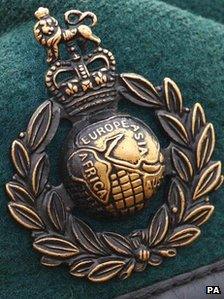Marines murder trial highlights battlefield rules
- Published

The men's identities are being kept anonymous
It has been one of the most unusual murder trials in recent history. A video was discovered which led to the prosecution - and formed much of the case against - three Royal Marines accused of killing an insurgent, despite the lack of a body.
This was also the first time British forces have faced a murder charge in relation to the conflict in Afghanistan.
The commandos, known only as Marines A, B and C, were accused of killing a badly-wounded insurgent in Helmand in September 2011. He had been held and was classed as a prisoner of war or captured enemy combatant.
Marine A was found guilty by the court martial board at Bulford, Wiltshire, while the other two marines were acquitted.
The dead insurgent's identity remains unknown to the UK authorities, who sent a team to find the body without success. According to the prosecution, only a memorial placed at the site by local villagers appears to mark the incident.
The video itself was shown to the seven-member court martial board, a military jury, on the opening day of the trial. The marines had all pleaded not guilty to murdering the Afghan national on or about 15 September 2011, contrary to Section 42 of the Armed Forces Act 2006.
In the video Marines A, B and C could be heard talking during the run-up to the incident, shot on the helmet-mounted camera of Marine B.
Marine A was seen shooting the Afghan national in the chest at close range with a 9mm pistol before saying- and swearing: "There you are. Shuffle off this mortal coil. It's nothing you wouldn't do to us."
He was then heard saying: "Obviously this doesn't go anywhere, fellas. I've just broken the Geneva Convention."
'Dignity and respect'
Marines B and C were accused of being "party to the killing" and of having "encouraged and assisted" Marine A to commit the murder.
On Wednesday, as the trial drew to a close towards the end of its second week, Judge Advocate Gen Jeff Blackett told the board - made up of men from the Royal Marines and Royal Navy - to consider the case against each defendant separately, and to use their "experience of life and the armed services" when considering their verdicts.
David Perry QC, prosecuting, had told the court martial that it was not a killing in the heat of battle.
He said: "It amounted to an execution, a field execution. An execution of a man who was entitled to be treated with dignity and respect, and entitled to be treated as any British serviceman or servicewoman would be entitled to be treated in a similar situation."
Judge Blackett told the board that to convict the men of murder they had to be sure that there was an "intention to kill".
He said that for Marine A to be convicted of murder, the board had to be sure that when he fired the pistol the insurgent was alive, that the defendant knew he was alive, that he intended to kill him and that the gunshot caused or accelerated his death.
The judge said that the case against Marines B and C was one of "secondary liability".
During his summing up, he asked the board: "Are you sure they did or said any of the things the prosecution allege? The prosecution case is that Marines B and C provided encouragement and assistance."
The media had asked for the footage to be made public but after legal argument, the judge rejected the request, citing the risk to other serving personnel.
Reverberations
Prof Michael Clarke, director of the Royal United Services Institute, says British troops already have a lot more training on the rules of engagement than ever before, leaving little room for doubt on what is or is not morally and legally acceptable on the battlefield.
He says it is made clear to all those deploying on operations that they are responsible for what they do.
"British troops always pride themselves on maintaining high standards of discipline, and in general I think that is true.
"But increasingly, the conditions of modern counter-insurgency make these events more frequent than we would like to believe and events a bit like this... do go on and it's very hard to say that that isn't somehow intrinsic to the nature of counter-insurgency on the ground."
He believes that there is not much more commanders can do to hammer home the message on the treatment of prisoners of war.
"The only thing the MoD can do is not try to hide in cases that look as bad as this, and they're going to have to accept that if we fight these wars, there will be cases that we are not very proud of - and that's not justifying them, I think it's just a realistic understanding of the ways things work."
However, the Royal Marines will have acutely felt the reverberations of this trial after so many tours of duty of Helmand, which have seen many deaths and also many gallantry medals.
They have long been seen as a well-trained elite, who faced tough and repeated operational tours of Afghanistan. The court was told of the provocations and distress faced by Royal Marines during that summer tour of duty, which included the deaths of seven of their number.
There were also incidents in which the defence said insurgents hung the body parts of dead Royal Marines from the trees in order to upset their comrades.
- Published8 November 2013
- Published7 November 2013
- Published31 October 2013
- Published30 October 2013
- Published23 October 2013